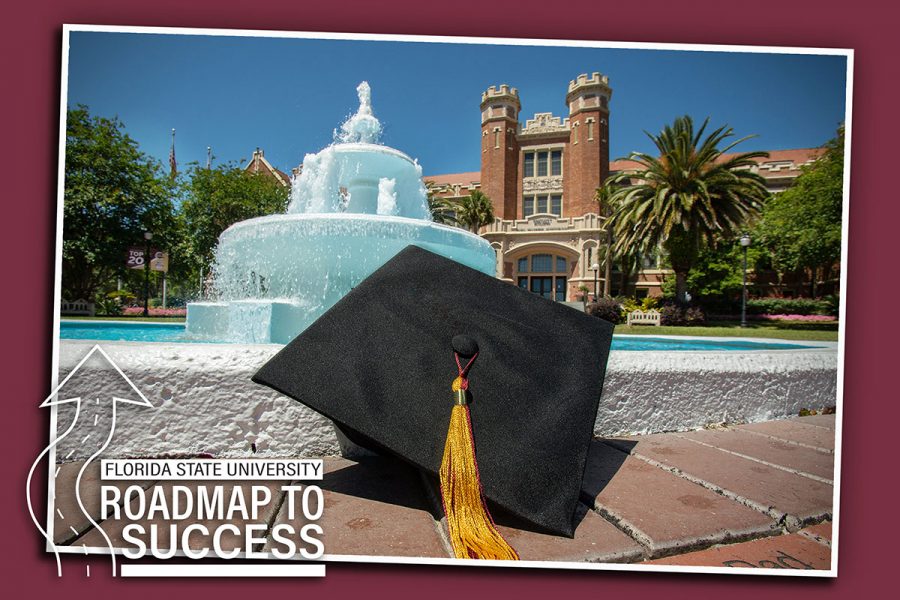
Florida State University’s 74-percent graduation rate is the highest in State University System of Florida history and ranks among the top 10 public universities nationally, but for FSU, it is more than just a record-setting number.
The achievement also fits squarely within the scope of the university’s expansive strategic plan, which launched in 2017. Student success is one of the plan’s pillars, which university officials have advanced through a combination of new initiatives and established programs in helping students realize their ultimate goal of earning a degree.
“FSU develops personalized, high-touch, supportive, caring programs because that’s what we do at FSU,” said Joe O’Shea, assistant provost and dean of Undergraduate Studies. “It’s the culture that we have, where our faculty and staff go above and beyond to make sure our students have what they need to be successful.”
The Graduation Planning and Strategies Office (GPS) is one of those programs making a difference in the lives of FSU students. It partners with offices and teams across campus to spur success among students with high credit hours but who face barriers to graduation.
Financial constraints, physical and mental health issues and family needs are just some of the challenges that force some students to put a college education on hold. The mission of GPS, which was established in 2017, is to identify and support undergraduate students confronting barriers to graduation.
GPS Director Jill Flees leads a four-person team in the effort. That might seem small compared to the thousands of students they serve at FSU, but it allows the team to be nimble in providing solutions tailored to each student’s unique challenges.
“Working with students who are facing barriers to degree completion, we look at it from individual, program, and policy standpoints to alleviate their specific barriers,” Flees said.
Often, these are students who have earned high credit hours but who have left the university without completing their degree. Since its founding, GPS has helped nearly 1,500 students re-enroll and graduate after leaving the university without completing their degree.
O’Shea said that while GPS is a “high-touch” initiative that the FSU community can feel proud of, there are also very real financial benefits.
“When a student leaves without finishing, that means the student isn’t able to realize the full benefits of having an FSU degree. But by giving this high level of personal support to students, we can reclaim students’ investment in their education and help them achieve their full potential.”
— Joe O’Shea, assistant provost and dean of Undergraduate Studies
“When a student leaves without finishing, that means the student isn’t able to realize the full benefits of having an FSU degree,” he said. “But by giving this high level of personal support to students, we can reclaim students’ investment in their education and help them achieve their full potential.”
Helping almost 1,500 people return to FSU and earn their degrees is an accomplishment that Flees said requires the help of partners across campus.
“Academic advisers, deans’ offices and student support offices are instrumental,” she said. “We are just one part of the story.”
The team at GPS is not alone. Throughout FSU, a host of programs and initiatives help shepherd students toward earning their degrees, and the process starts as soon as they arrive on campus.
New arrivals to FSU can tap into Engage 100. The program, which launched two years ago, is aimed at freshmen and transfer students and designed to support their transition to FSU and engagement on campus. From personal, social and professional perspectives, Engage 100 seeks to guide students toward activities that parallel their goals while avoiding pitfalls and challenges.
The “Degree in Three” program helps students — especially those who arrive at FSU with some credit hours in hand — to graduate in three years or less. The “Take 15” campaign, launched in 2015 by provost Sally McRorie, encourages students to take 15 or more credit hours per semester, which keeps them on track to graduate on a four-year timeline.
At the Center for Academic Retention & Enhancement (CARE), FSU offers support and programming for undergraduate students from disadvantaged backgrounds, frequently those from low-income families and first-generation college students. One such outreach is the Unconquered Scholars Program, which promotes the success of those who have experienced homelessness, foster care, relative care, or ward of the state status.
Together, these programs and initiatives have helped spur FSU’s record-setting graduation rate, said O’Shea. They have also helped build upon a university culture with students and student success at its core.
O’Shea added: “We have a culture where every student matters.”




